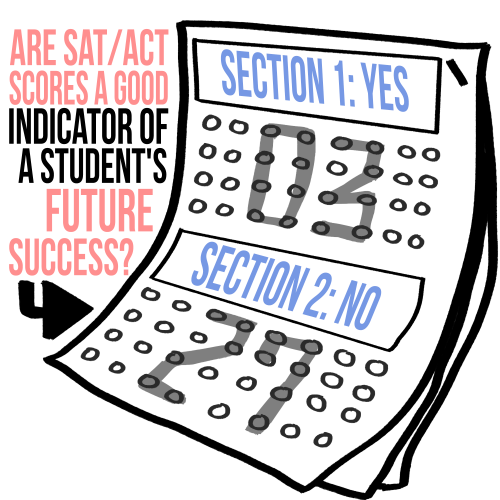Staff Ed: Are SAT and ACT Scores a Good Indicator of a Student’s Future Success?
High school challenges and anxieties are familiar to all of us—balancing schoolwork and activities, trying to maintain a social life and stressing out about the future. For most, the latter entails researching colleges, studying for the SAT and ACT and even taking classes to prepare. However, we sometimes have to pause and ask ourselves, “Is this really necessary?”
In a study released by the National Public Radio, it was demonstrated that students who did not submit test scores when applying to colleges and those who did had a 0.05 difference in their GPAs, raising the question about whether or not the SAT and ACT are accurate measures of a student’s potential success.
To some, the rigorous preparation required for most to receive their desired score on the SAT is indicative of a student’s dedication and motivation to do well. It tests a student’s retention of the material they have been taught to ensure that they understand it and can apply it in the “real world.”
However, the most important aspect of it is that it offers a standard to measure all college applicants by. Comparing students using GPAs and other sources is not always accurate. An A may be a C in the same class at two different schools.
The SAT offers a comprehensive standard for all students to meet, or even to rise above. It doesn’t just set a standard for students, but also enables colleges and universities to make clear, direct comparisons. Standardized testing has proven itself necessary, as there needs to be one common form of comparison to gauge how successful that can be, much like the Common Core Standards Initiative is currently being developed to accomplish.
On the other hand, the tests are problematic, as it ascertains test-taking abilities and endurance rather than true understanding of a subject. Though a student may be particularly knowledgeable about a subject, the stamina required for a four-hour-long test can often frazzle nerves and cause them to forget material. Furthermore, the SAT is inherently flawed. It was originally intended to eliminate bias between people of different socioeconomic backgrounds when applying to colleges, yet taking SAT classes in an attempt to cultivate a better score has become not only increasingly popular, but also increasingly expensive as well. As a result, students from a wealthier background possess an advantage over others, as they can afford these expensive classes while others may not be able to. It has become clear in recent years that the College Board’s goal is to make as much money as possible off of the testing industry.
The SAT’s biggest flaw, however, appears to be that it cannot measure the true depth of human intelligence. Intelligence is complex and can be defined in many divergent ways by contrasting people. We cannot condense the whole of a person’s knowledge into a four-hour, unanalytical test. Even so, if a teenage student does well, it does not necessarily imply they will be successful as an adult. A number of factors contribute to success, such as talent, determination and motivation, which are neglected when colleges ignore a student’s other abilities in favor of their test scores. Thus, students can succeed even without superb or even decent SAT scores.
So while the SAT offers a comprehensive look into a student’s test taking abilities, it lacks insight regarding a student’s substance and thus, their future success. We may not be able to abolish a test that is currently such a large variable in applications, but we can reform it to better reflect how well students can do in college and beyond.
